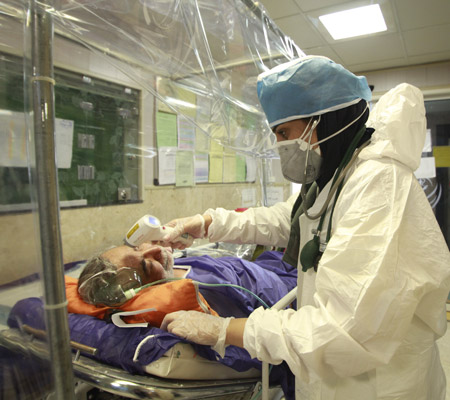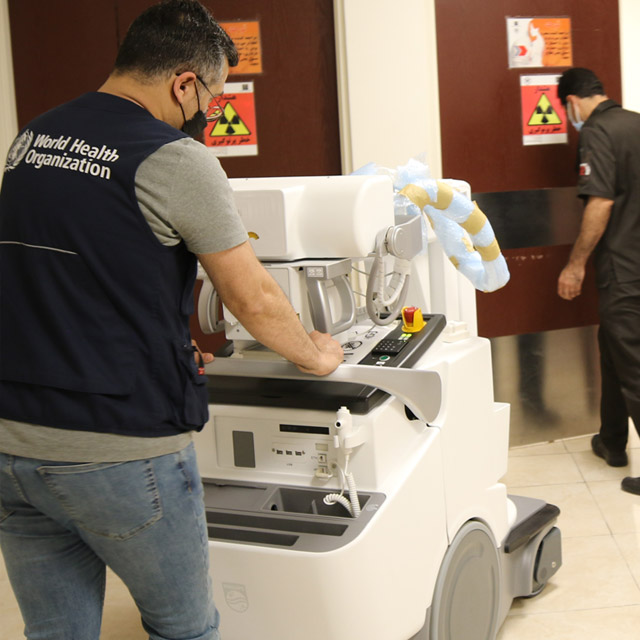 On 30 January 2020, WHO’s Director-General declared the COVID-19 outbreak a Public Health Emergency of International Concern (PHEIC) under the International Health Regulations (IHR 2005). On 19 February 2020, Islamic Republic of Iran reported its first confirmed cases of infections in Qom. Since the beginning of the pandemic, the country has reported the highest number of cases and deaths in WHO’s Eastern Mediterranean Region. COVID-19 continues to have a severe impact on the national health system and the Iranian population, already affected by international sanctions, complicating the provision of essential and lifesaving medical and laboratory supplies. As the pandemic hit the country, the demand for essential lifesaving equipment and consumables to enhance diagnostic capacity through the national laboratories network and case management has dramatically increased to ensure a timely and efficient response to the outbreak.
On 30 January 2020, WHO’s Director-General declared the COVID-19 outbreak a Public Health Emergency of International Concern (PHEIC) under the International Health Regulations (IHR 2005). On 19 February 2020, Islamic Republic of Iran reported its first confirmed cases of infections in Qom. Since the beginning of the pandemic, the country has reported the highest number of cases and deaths in WHO’s Eastern Mediterranean Region. COVID-19 continues to have a severe impact on the national health system and the Iranian population, already affected by international sanctions, complicating the provision of essential and lifesaving medical and laboratory supplies. As the pandemic hit the country, the demand for essential lifesaving equipment and consumables to enhance diagnostic capacity through the national laboratories network and case management has dramatically increased to ensure a timely and efficient response to the outbreak.
To support the Government of the Islamic Republic of Iran in the fight against COVID-19, WHE initiated close and direct collaboration with the Ministry of Health and Medical Education and the national COVID-19 task force to address the highest priority and most urgent health system needs, including strengthening the health system’s capacity in diagnosing and treating COVID-19 patients.
What we have achieved

Coordination, planning, financing, and monitoring.
In line with the measures outlined in WHO's COVID-19 strategic preparedness and response plan and in response to the requested list of essential medical supplies, released by the Ministry of Foreign Affairs, the WHO country office has mobilized an assembly of all United Nations agencies and international health organizations represented in Islamic Republic of Iran (Pro-Health) to ensure an effective and rapid response to country needs. Through Pro-Health, WHO facilitated establishment of a procurement tool to provide lifesaving essential medical and laboratory equipment. WHO used the Pro-Health mechanism to expend generous contributions from international donors to procure prioritized medical and laboratory items.
Risk communication, community engagement and infodemic management
Due to the high demand for timely and reliable information about COVID-19, the WHO technical risk communication and social media team have been working closely with relevant national stakeholders to track and respond to myths and rumours and ensure regular and transparent communication to the public about the current health emergency.
Surveillance, epidemiological investigation, contact tracing, public health and social measures
To monitor the situation and share information on the trend of the disease with other national and international partners, since the start of the pandemic, the WHO country office has published a daily update. This update illustrates the trend of COVID-19 by providing epidemiological data, including the number of COVID-19 new laboratory-confirmed cases, deaths, intensive care cases, and national and international travel restrictions. To provide evidence for targeted interventions and conduct situation analyses of the intensity of the transmission of COVID-19, the country office has supported the Ministry of Health and Medical Education to undertake epidemiological studies in general, and in particular among health care workers. Capacities for outbreak identification, contact tracing, management and the performance of rapid response teams have been strengthened through the development and dissemination of guidelines and the conducting of training workshops.
Laboratories and diagnostics
To strengthen the capacity of the national laboratory network in responding to the ongoing COVID-19 pandemic, the country office has provided support to the Ministry to procure laboratory items, including diagnostic kits, laboratory machines and consumables and in adapting and translating the good laboratory practice guidelines, strengthening the capacity of the national diagnostic programme to generate and systematically use strategic information and improve laboratory response to the COVID-19 pandemic, providing support to install and test equipment and devices, as well as conducting training of laboratory staff to use the equipment safely and maintain equipment appropriately.
Infection prevention and control, protecting the health workforce
The country office has supported the Ministry in containing COVID-19 at the national and facility levels through strengthening of infection prevention and control (IPC) capacity, fostering implementation of IPC measures and procuring personal protective equipment (PPE).
Case management, clinical operations and therapeutics
To strengthen effective case management and to ensure quality of life for all patients regardless of the severity of disease, WHO provided technical support to the Ministry in assessing readiness of pre-hospital emergency medical services and documenting the role of the National Emergency Medical Organization in managing COVID-19. This activity resulted in the identification and a review of challenges, and identified immediate and priority actions to further enhance the capacity of the national emergency system preparedness and response.
Operational support, logistics, and supply chains
Anticipating health system needs and assessing the accessibility of medical supplies, including diagnostic and therapeutic devices and their consumables, during the pandemic was essential in implementing an effective response programme. In order to achieve this outcome, research involving medical equipment market analysis in the country was undertaken and its findings were incorporated into strategic and operational planning.
Maintaining essential health services and systems
WHO has provided technical support in strengthening the role of primary health care in COVID-19 and assessing the association between noncommunicable disease (NCDs) and COVID-19, including evaluating the impact of COVID-19 in disrupting access to essential services for NCD patients, analysing susceptibility and vulnerability to COVID-19 among people living with an NCD and analysing NCD-related co-morbidities among patients with COVID-19. Subsequently, the country office supported implementation of the national NCD response plan to enhance utilization of NCDs-related services and monitor outcomes.
What is next
WHO, in close collaboration with the Ministry of Health and Medical Education, will support development of a mental health response plan in the context of the COVID-19 pandemic to ensure continuity of mental health and substance use management services in the country, including enhancing the performance of telephone-based psychological counselling services.









